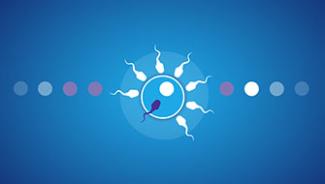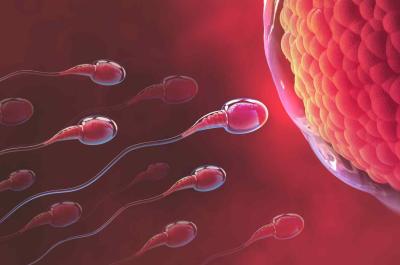
Infertility affects a sizable proportion of the population - around 16% of couples are unable to conceive after one year of unprotected intercourse1. In this article we look at a number of issues which can cause fertility problems in both men and women:
- · Approximately a third of cases of infertility are female related, a further 20% male related and almost half involve both partners or are unexplained2.
- · For women, infertility is often related to hormones or issues with her Fallopian tubes or uterus.
- · If a woman is not ovulating, identifying this as soon as possible can allow her to take appropriate clinical action.
- · For men, infertility is often related to low sperm count and erectile dysfunction.
- · Lifestyle aspects such as weight, smoking and alcohol intake can lower fertility for men and women
- · If you have been trying for a baby for a year with no success, and are under 35, you should speak to your healthcare professional for further advice. If you are over 35, you should seek help after 6 months trying, and immediately if you are over 40.
What can cause fertility problems?
Understand the reasons and explore your options.
If you want to know more about what can cause fertility problems in women, men and couples together, below you’ll find some of the most common conditions or causes of infertility. This list is not exhaustive and you may want to talk with your health care provider for further support for your own individual situation.
What can affect fertility in women?
There are two common areas where things can be wrong and make it difficult to get pregnant – problems with hormones and problems with the Fallopian tubes & uterus.
1. Hormone problems
Anovulation
Ovulation is controlled by fertility hormones. If for any reason your hormone levels are disturbed, your ovulation can be affected. Anovulation is when a woman’s ovary fails to produce, mature or release an egg.
Most women will experience anovulatory menstrual cycles at some point during their reproductive lives. This is most common in young women who have just started their periods or older women approaching the menopause, but anovulatory cycles also happen amongst healthy, regularly menstruating women.
Some women suffer from chronic anovulation, and this may be an indication of an underlying hormonal condition, such as Polycystic Ovarian Syndrome (PCOS), which can make natural conception difficult3.
A sign of possible ovulation problems is very irregular or no periods.
Hormonal disturbance that affects ovulation can be caused by many factors. These include dramatic changes in weight, stress, strenuous exercise and illness.
If a healthy, regularly menstruating woman is using ovulation tests, and detects an occasional anovulatory cycle, be reassured that this is normal, and it should have no impact on your fertility. However, if you fail to detect the LH surge with ovulation tests (‘peak’ on Clearblue Advanced Ovulation Test) for three consecutive cycles it would be worth speaking to a healthcare professional.
Polycystic Ovarian Syndrome (PCOS)
The term ‘polycystic ovaries’ describes ovaries that contain lots of small ‘cysts’ or egg-containing follicles that haven’t developed properly, often due to a hormone imbalance. Symptoms can include irregular or no periods, weight gain, excess hair growth as well as problems trying to conceive. It is estimated that about one in five women in the UK have polycystic ovaries4.
Short luteal phase
If the number of days between when you ovulate and when your next period starts is too few (less than 10), this can mean that, although you may conceive, the fertilised egg is expelled before it can implant in the lining of the womb. This is something you may notice if you are using an ovulation test. To see how long your luteal phase is, count the number of days between your second peak fertile day and when your period starts. If you think your luteal phase is too short, talk to your doctor, as this condition may be treatable.
I have very short cycles, is that why I can't get pregnant?
Professor Michael Thomas
The normal cycle range is usually 23 to 35 days. Cycles shorter or longer than that range can be associated with fertility issues. Over the course of a woman's reproductive life span, her typical cycle lengths will fall in this time frame. If your cycles are usually less than 23 days, you should see your physician.
Early menopause
Once you have reached menopause, pregnancy is not possible, and in the lead up to menopause (the perimenopause) it can be very difficult to become pregnant. If your mother had an early menopause your chances are much higher, so, try to find out at what age your mother started menopause. If she had an early menopause it may be worth talking to a healthcare professional about your future plans for pregnancy.
2. Problems with Fallopian tubes and uterus
Fallopian tubes carry the egg from the ovary to the uterus. A blockage in your Fallopian tubes can prevent sperm getting to the egg; a growth in the uterus can stop a fertilised egg from implanting.
Untreated chlamydia infection
The most common cause of blocked Fallopian tubes is a chlamydia infection that has been left untreated. Chlamydia is a common infection that is easily transmitted by unprotected sex. Some women may be completely unaware that they ever had a chlamydia infection due to the lack of symptoms. If there’s a chance you could have contracted chlamydia, go to your doctor for a test.
Fibroids
These are abnormal growths of muscular tissue in the uterus that can block the Fallopian tubes or stop a fertilised egg from implanting. Please visit your doctor for further advice.
Endometriosis
This is when the tissue that lines the uterus grows outside the uterus. It can obstruct the Fallopian tubes and can prevent fertilisation. Endometriosis can cause heavy or very painful periods. It can be treated by medication or by removing the extra tissue. Your doctor will be able to tell you more.
I suffer from endometriosis and am worried I won’t be able to get pregnant, is that true?
Professor Bill Ledger, Fertility Specialist
Many women with mild endometriosis will conceive normally although chances of incurring some fertility problems are higher. Severe endometriosis can damage the Fallopian tubes and ovaries, and the adhesions that can come with endometriosis can also block the Fallopian tubes. Your gynaecologist will be able to advise you on what to do about this. Don't try for more than a few months without getting advice, if you do have endometriosis.
What typically causes fertility problems in men?
There are three main issues that affect a man’s fertility: low sperm count or poor sperm quality, erectile dysfunction and other, less common causes.
Low sperm count or poor sperm quality
If there aren’t as many sperm as usual in the male ejaculate, the chances of a sperm fertilising an egg are reduced. If the sperm quality is poor they may be unable to reach the egg and break through the membrane to fertilise the egg.
Sperm production can be lowered if the testes aren’t kept cool. Your partner can make sure his testicles don’t get too hot by wearing loose underwear. Sperm count and quality can be assessed by a simple test which you can get via your doctor.
Erectile dysfunction
If the man has trouble getting or maintaining an erection, for physical or psychological reasons, he may find it difficult to have sex. There is help available, so see your doctor for additional information.
Other causes
Much less common causes of male fertility problems include a blockage in the tube that carries sperm from the testicles, a genetic condition, hormone problems or other rarer conditions. Your doctor will be able to identify these problems through tests.
Other factors that can reduce fertility
There are other issues which can affect both the man’s and woman’s fertility.
Drinking alcohol
Fertility in both men and women can be affected by drinking too much alcohol. Reducing the amount of alcohol you drink can help you to conceive. Also, drinking during pregnancy can affect your babies health, so if you are trying for a baby it is worth cutting down because you never know when you are going to be successful.
Smoking
Compared to non-smokers, men who smoke can have a lower sperm count and a higher number of abnormal sperm. In women, smoking can affect fertility and trigger early menopause. It can also increase the risk of miscarriage and early onset of labour. Smoking is very bad for the health of your unborn baby and it is best to stop smoking before you become pregnant.
Both you and your partner should try to stop smoking if you’re trying to conceive.
Recreational Drugs
There are many different sorts of recreational and illegal drugs used today and how they affect fertility is not well studied. As many drugs can have bad effects on a developing baby, you should stop using any recreational or illegal drugs when trying to conceive.
Weight
Being underweight or overweight can alter your menstrual cycle and reduce your chances of conception. Overweight men can have a lower sperm count and poor sperm quality. Visit your doctor or nurse to know the ideal weight for you and for practical advice on gaining or losing weight if it’s necessary.
Medication
If you, or your partner, are taking any medication, check with your doctor that it won’t reduce your fertility. If it does reduce fertility, there may be alternatives available.
Lubricants
Vaginal dryness is more common than we may think. In a study across 11 countries involving around 6,500 women, up to 18% of women aged 18–34 years reported always or usually experiencing vaginal dryness5. This can be worse when trying to conceive as there is a tendency to have lots of baby-making sex. Some of the most commonly available lubricants can be harmful to sperm; use of such lubricants can therefore reduce your chances of becoming pregnant. Sperm-friendly lubricants are available.
Age
A woman is born with a lifetime’s supply of eggs and the number reduces gradually with age. After 38-40 years the rate of loss is much faster and the quality of the eggs also declines. If you’re over 35, it’s a good idea to visit your doctor after around six months of trying for a baby and if you’re over 40, ask your doctor for advice when you start trying to conceive. Less is known about fertility in older men but it’s thought to decline from around the age of 40 too.
Unexplained infertility
Sometimes all clinical tests will be reported as normal but after years of trying you’re not pregnant. This can be very frustrating and distressing because there is nothing to focus on that can be rectified or treated. It is estimated that around one third of couples with unexplained infertility will get pregnant naturally within three years without intervention3.
- 1. Thoma et al. Fertil Steril. (2013); 99(5): 1324–1331.
- 2. Thonneau P., et al. Human Reproduction (1991) 6(6): 811-816.
- 3. Hambridge HL., et al. Human Reproduction. (2013) 28: 1687–1694
- 4. NHS. Polycystic ovary syndrome. http://www.nhs.uk/Conditions/Polycystic-ovarian-syndrome/Pages/Introduct... (accessed April, 2017)
- 5. Leiblum SR., et al. J Sex Med. (2009) 6: 2425–2433.

Advanced digital ovulation test
In every cycle there are only a few days when a woman can conceive, so having sex on these days is very important if you are trying to get pregnant. The Clearblue® Advanced Digital Ovulation Test is the first and ONLY test that typically identifies 4 or more fertile days each cycle.

Get pregnant naturally
Ovulation tests are accurate and simple to use.



